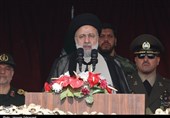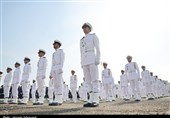Killing of Revered Commanders Led to Consensus in Iraq to Expel US: Ex-UN Official
TEHRAN (Tasnim) – A former official at the United Nations and professor of international law referred to the massive rally held in Iraq on Friday calling for an end to the military presence of the US, and said the recent assassination of revered commanders of Iran and Iraq created the consensus.
“It seems as if these high-profile assassinations of such revered military leaders have created an overwhelming consensus in Iraq to expel the 5,200 remaining American troops,” Professor Richard A. Falk said in an interview with Tasnim.
“This consensus has been expressed by the vote in the Iraqi Parliament, which while not including support from Sunni and Kurdish elements, did express a unified majority opinion in the country,” he added.
Professor Richard Anderson Falk is the author or co-author of 20 books and the editor or co-editor of another 20 volumes. In 2008, the United Nations Human Rights Council (UNHRC) appointed him to a six-year term as a United Nations Special Rapporteur on "the situation of human rights in the Palestinian territories occupied since 1967”.
The following is the full text of the Interview:
Tasnim: Iraqi people from all walks of life took to the streets in the capital, Baghdad, on Friday for a million-man rally to call for an end to the military presence of the United States in their country. The rally was called by senior Iraqi resistance figures, a few weeks after the parliament voted to expel American troops following an illegal US airstrike in Baghdad that led to the assassination of Iranian IRGC Quds Force Commander Lt. Gen. Qassem Soleimani and the Deputy Commander of Iraq's Popular Mobilization Units (PMU) Abu Mahdi al-Muhandis. What do you think about the massive anti-US demonstration and how do you predict its outcome?
Falk: I am always hesitant to predict future developments given the explosive situation that currently exists in the Middle East, especially with regard to Iran and Iraq. There is no doubt in mind that the chain of events initiated by the assassinations of General Soleimani and Deputy Commander Mahdi-al-Muhandis will generate dangerous disruptive acts, especially aimed at challenging the American military presence in Iraq, and possibly elsewhere in the region. The announced US refusal to withdraw in response to the strong call by the Iraqi Parliament and Prime Minister is certainly an inflammatory response by the US Government, and likely to generate further Iraqi demonstrations and calls for an early and complete withdrawal.
Tasnim: As you know, the massive demonstration and the Iraqi parliament's resolution calling for the expulsion of the foreign forces from the Arab country have called into question the legitimacy of Washington’s military presence in Iraq. Do you think that the Iraqi administration would finally be forced by the people and the parliament to expel the foreign troops?
Falk: I believe the pressure on the Iraqi government, and its leaders, to expel foreign military forces is very great, but whether they have the will and capability to challenge the US refusal to leave seems presently doubtful. What may be more likely is some sort of face-saving compromise, perhaps secretly negotiated, that can lead to an American withdrawal. Trump’s focus on the US presidential elections may also favor a de-escalation of tensions more likely than engaging in military action, although possibly tempting as a distraction from the impeachment proceedings challenging Trump, he would be fulfilling his 2016 pledge to avoid military engagements in the region if he could find a way to do so without being criticized as weak or humbled.
Tasnim: What do you think about the impact of the US move to assassinate Lt. Gen. Soleimani and revered commander Abu Mahdi al-Muhandis on the unity of the Iraqi people and their call for the expulsion of the American troops?
Falk: It seems as if these high-profile assassinations of such revered military leaders have created an overwhelming consensus in Iraq to expel the 5,200 remaining American troops. This consensus has been expressed by the vote in the Iraqi Parliament, which while not including support from Sunni and Kurdish elements, did express a unified majority opinion in the country. If the United States had responded in a manner respectful of Iraqi sovereignty the issue might have been resolved relatively easily, and in a way that served the interests of both sides, but the defiant response of Pompeo and Trump has made any prospect of accommodation very unlikely in the near future, although Trump has exhibited a tendency in the past to make abrupt changes in approaches to crisis situations if it suits his personal interests, sometimes for the better, and often for the worse. It is to be hoped that the Iraqi government will remain firm in its position on the removal of foreign forces and that the US Government will refrain from threats of sanctions and other punitive policies.






